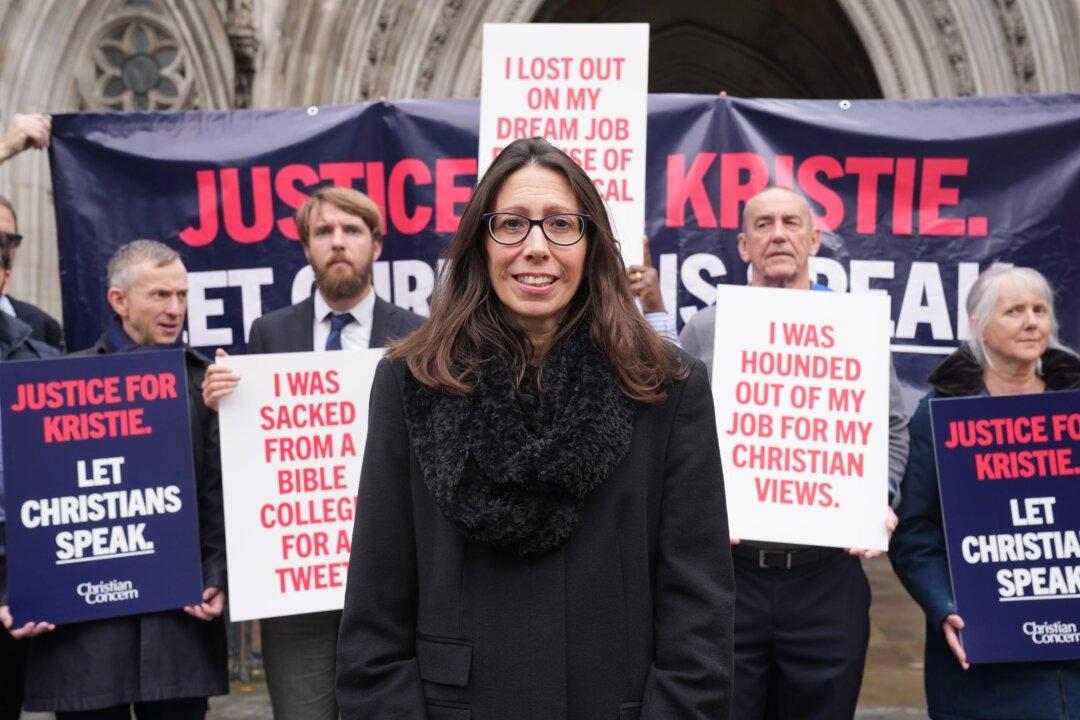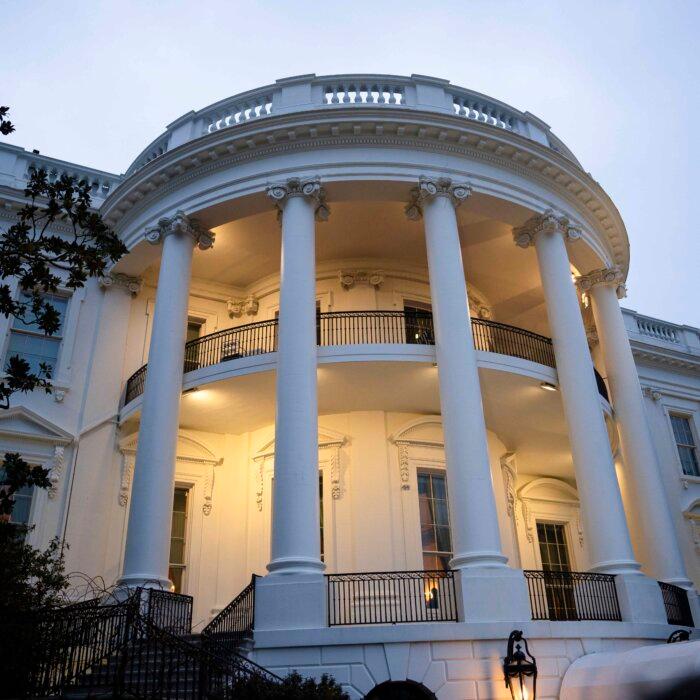Employees cannot be dismissed for sharing religious beliefs that their bosses or a third party may disagree with as this would constitute “unlawful direct discrimination,“ the Court of Appeal has ruled in what has been hailed by campaigners as a ”landmark” victory for free speech.
Kristie Higgs, a practising Christian, was sacked from her administrative role at Farmor’s School in Fairford, Gloucestershire, in 2019 for sharing Facebook posts which criticised the promotion of gender ideology to children in sex and relationship education.
Higgs, a mother of two who has been embroiled in a court battle related to her dismissal for more than five years, welcomed the verdict handed down on Wednesday as a “victory for free speech as much as for religious freedom.”
The judgment from Lord Justice Underhill, sitting with Lord Justice Bean and Lady Justice Falk, branded the decision to dismiss Higgs for gross misconduct as “unlawfully discriminatory” and “unquestionably a disproportionate response.”
Their ruling said: “The dismissal of an employee merely because they have expressed a religious or other protected belief to which the employer, or a third party with whom it wishes to protect its reputation, objects will constitute unlawful direct discrimination within the meaning of the Equality Act.”
It continued: “The school sought to justify her dismissal on the basis that the posts in question were intemperately expressed and included insulting references to the promoters of gender fluidity and ‘the LGBT crowd’ which were liable to damage the school’s reputation in the community: the posts had been reported by one parent and might be seen by others.
“However, neither the language of the posts nor the risk of reputational damage were capable of justifying the claimant’s dismissal in circumstances where she had not said anything of the kind at work or displayed any discriminatory attitudes in her treatment of pupils.”
‘Brainwashing Children’
She either copied and pasted from another source or reposted the content, adding her own reference on one post to “brainwashing our children.”Pupils were to learn about the No Outsiders In Our School programme, a series of books which education authorities say is intended to teach the Equality Act in primary schools, but which critics say is promoting gender ideology, such as the belief that children can be “transgender,” onto impressionable children.
After an anonymous complaint about Higgs’s posts, which the judgment said came from another parent at the school, she was suspended and then dismissed from her role as a pastoral administrator and work experience manager.
An employment tribunal found in 2020 that while Higgs’s religion was a protected characteristic, her dismissal was lawful, but this decision was overturned by an Employment Appeal Tribunal (EAT) in 2023.
The EAT ruled the case should be sent back to an employment tribunal for a fresh decision, which Higgs’s lawyers challenged in the Court of Appeal as “unnecessary.”
Richard O’Dair, the lawyer acting for Higgs, told a hearing in October in written submissions that protecting the school’s reputation and the rights of others provided “no justification” for her “extremely severe” dismissal.
He said there were “extremely speculative and nebulous concerns” about how people might misinterpret her posts and perceive the school.
Sean Jones, KC, for the school, told the court in written submissions that remitting the case was “the appropriate course” as “fuller reasons” for the decision were needed.
He said: “[Higgs] was not dismissed for manifesting [her beliefs] but because the manner in which it was manifested could reasonably have caused and did cause others to think she was expressing homophobic or transphobic views.”
But in a 57-page ruling allowing Higgs’s appeal against the EAT’s remittal decision, Underhill said Higgs’s posts were “not grossly offensive.”
He said: “Any reputational damage would only take the form of the fear expressed by the complainant, namely that the claimant might express at work the homophobic and transphobic attitudes arguably implicit in the language used.
“I accept that if that belief became widespread it could harm the school’s reputation in the community.
“But the risk of widespread circulation was speculative at best.”
He continued: “I do not believe that dismissal was even arguably a proportionate sanction for the claimant’s conduct.
He said it might have been “unwise” for Higgs to share the posts, which he said could be read as “a series of derogatory smears” which in the words of the tribunal used “florid and provocative language.”
‘Subjective Concerns’
Following the ruling, Higgs, surrounded by several supporters outside the Royal Courts of Justice, said: “Today’s judgment is as important for free speech as it is for freedom of religion.“Employers will no longer be able to rely on their theoretical fears of reputational damage or subjective concerns about causing offence to discipline employees for exercising their fundamental freedom to express their deeply held beliefs.
‘Important Precedent’
Higgs was supported throughout her legal battle by the Christian Legal Centre, which welcomed the judgment, with Chief Executive Andrea Williams saying in a statement: “Free speech and religious liberty are not yet extinguished from the English law. The outcome of Kristie’s case sets an important legal precedent for many years to come.“The Court of Appeal has confirmed, loud and clear, that ideological censorship at workplace is illegal, and any employer who tramples upon their employees’ right to freedom of thought, conscience and religion breaks the law of the land.
“This is a great victory for Kristie, who lost her job and livelihood for doing no more than expressing her dismay at the nonsensical ideas of gender-fluidity being taught to her child at a Church of England primary school.”
Forstater won £100,000 in compensation after she was unlawfully dismissed from her job for stating that biological sex is real and immutable, with the judgment making clear that so-called “gender critical” views are protected under the 2010 Equality Act.







